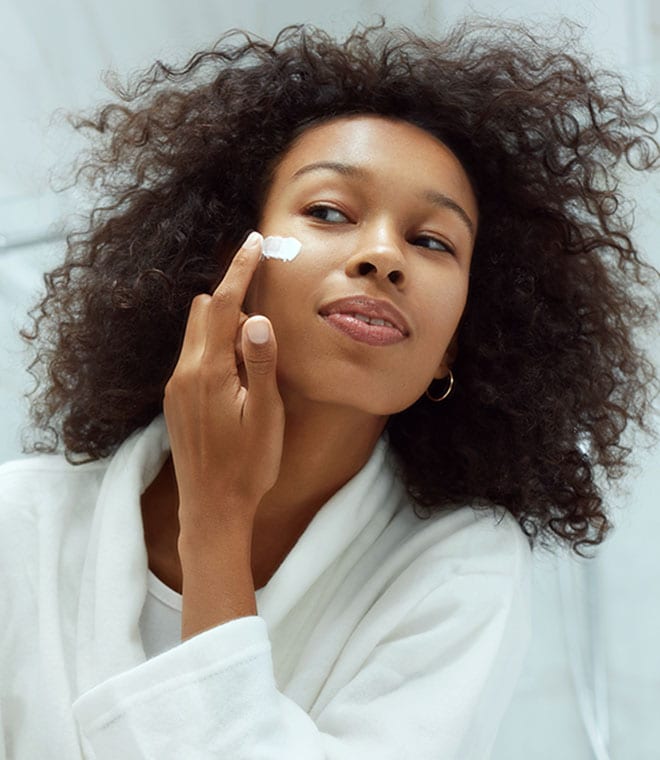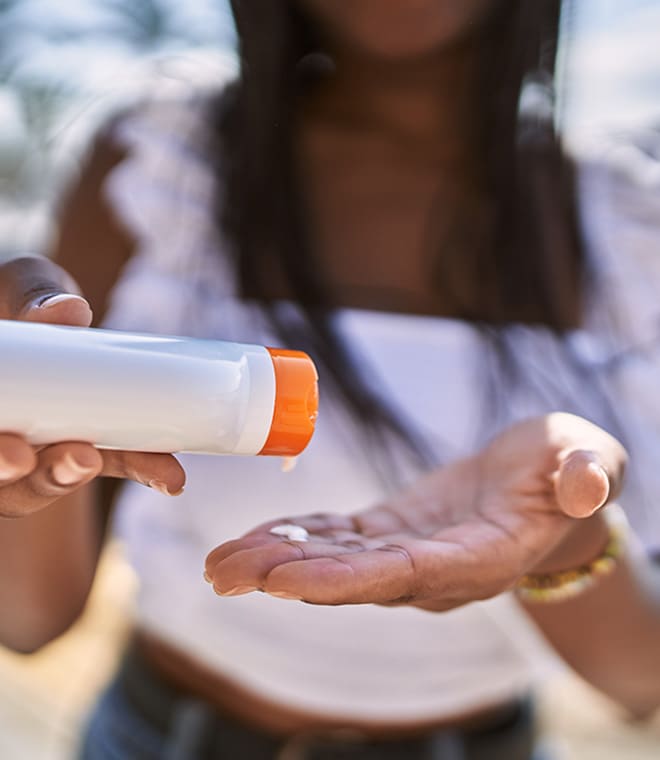Beauty
How do face exfoliators work?
By Anna H. Chacon, MD, Fellow of the American Academy of Dermatology Jul 29, 2024 • 5 min
Face exfoliators are skin care products that come in various forms, and they may offer many benefits for your complexion. Knowing how they work can help you choose one that may be appropriate for your skin’s unique needs.
What is exfoliation?
Your skin is in a continuous state of renewal. New cells are constantly being made within the outermost layer of skin, the epidermis. As these new cells emerge, the older cells on the skin's surface are shed. Every day, the average person naturally sheds approximately 40,000 skin cells.
Exfoliation is a way to support the natural cellular turnover process. It involves removing old cells from the skin's surface to reveal the newer cells hidden underneath. Exfoliating regularly can help improve the following:
- Skin texture: Removing dead cells can leave your complexion feeling softer and smoother.
- Skin appearance: By revealing newer skin, exfoliating can restore radiance and reduce the prominence of hyperpigmentation.
- Signs of aging: Resurfacing the skin through exfoliation may make fine lines less noticeable.
- Acne: Because dead skin cells can contribute to pore blockages, exfoliation can be helpful for improving acne.
Types of face exfoliators
Face exfoliators are tools and skin care products designed to exfoliate the face and neck. There are two main types, and each works differently.
1. Mechanical exfoliators
Friction is the driving force behind mechanical face exfoliators. The physical action of using one of these exfoliators loosens dead skin, allowing it to be eliminated. Examples of mechanical face exfoliators include:
- Skin cleansing brushes
- Exfoliating facial sponges
- Sugar scrubs
- Salt scrubs
- Cleansers and scrubs that contain exfoliating beads
- At-home microdermabrasion and dermaplaning tools
2. Chemical exfoliators
Instead of friction, chemical exfoliators contain ingredients that break the bonds holding old skin cells in place. Key ingredients commonly used in chemical face exfoliators include:
- Salicylic acid, a beta hydroxy acid (BHA)
- Lactic acid, an alpha hydroxy acid (AHA)
- Glycolic acid, an AHA
- Citric acid, an AHA
- Hydroxycaprylic acid, an AHA
- Hydroxycapric acid, an AHA
Tips for using face exfoliators
To get the most benefit from face exfoliators, consider the following tips:
1. Choose a product that agrees with your skin type: Which type of face exfoliator fits your needs depends largely on your skin type. If you have sensitive or acne-prone skin, a mild chemical exfoliator is often a gentler choice than a mechanical product. Those with oily or thicker skin may benefit from a stronger chemical or mechanical exfoliator. Your healthcare provider can help you determine which face exfoliator is right for your skin’s needs.
2. Start slowly: If you opt for a mechanical exfoliator, start by using it once a week. Maintain a gentle touch and exfoliate for no more than 30 seconds. As you see how your skin responds, you may decide to gradually increase the frequency of use to two or three times per week.
Start with a mild product when using chemical exfoliators. You can compare the strengths of chemical exfoliators by looking at the percentage of the key ingredients. Start with a lower concentration of these ingredients.
3. Adhere to product directions: Before using any new face exfoliator for the first time, read the directions carefully. Follow these instructions closely unless your healthcare provider gives you other advice.
4. Follow-up with moisturizer: After exfoliating, apply a moisturizer formulated for your skin type. Doing so can help replenish any moisture the face exfoliator stripped away.
5. Keep an eye on your complexion: As you begin using your face exfoliator, look for signs of irritation and dryness, such as redness, roughness or flaking. These symptoms may indicate that you need to exfoliate less often or use a milder product.
6. Use sun protection: Applying sunscreen is important for everyone, but if you’re using a chemical face exfoliator that contains AHAs, using sunscreen daily is even more crucial. Chemical exfoliators can increase your skin’s sensitivity to the sun, so be sure to use a broad-spectrum sunscreen or a sunscreen moisturizer during your morning skin care routine.
Updated July 2024.
Sources:
- https://www.aad.org/public/everyday-care/skin-care-secrets/routine/safely-exfoliate-at-home
- https://www.health.harvard.edu/blog/have-you-exfoliated-lately-202405203042
- https://hsci.harvard.edu/news/our-protective-outer-layer
- https://my.clevelandclinic.org/health/body/10978-skin
- https://www.aad.org/public/cosmetic/age-spots-marks/microdermabrasion-overview
- https://www.fda.gov/cosmetics/cosmetic-ingredients/alpha-hydroxy-acids
- https://www.canr.msu.edu/news/trending-sun-safety-alpha-hydroxy-acids
- https://www.health.harvard.edu/diseases-and-conditions/keratosis-pilaris-treatment-and-self-care-for-this-common-skin-condition
- https://health.clevelandclinic.org/dermaplaning-at-home
- https://health.clevelandclinic.org/guide-to-facial-acids



